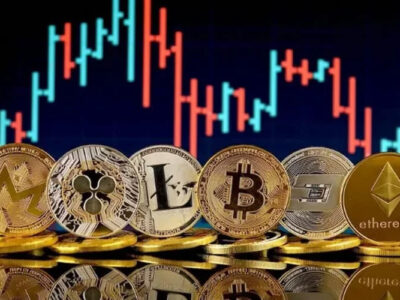
The convergence of cryptocurrencies, smart contracts, and crypto games has ushered in a paradigm shift in digital entertainment and the broader economy. By redefining ownership, empowering players, and creating new economic opportunities within virtual worlds, these technologies are revolutionizing how individuals experience and engage with digital entertainment. The article delves into the transformative potential of cryptocurrencies, smart contracts, and NFT games.
1. Tokenization and Ownership
The convergence of cryptocurrencies and smart contracts has empowered NFT games to revolutionize the gaming industry. NFT games use non-fungible tokens (NFTs) to represent unique in-game assets. These NFTs, powered by smart contracts, ensure secure ownership, provable scarcity, and seamless peer-to-peer transactions on blockchain platforms.
Cryptocurrencies play a vital role as the medium of exchange within crypto games, facilitating the acquisition, trading, and selling of NFT assets. The integration of cryptocurrencies fosters vibrant digital economies and unlocks new avenues for player engagement, creativity, and monetization. NFT games redefine ownership, empowering players with verifiable digital possessions and driving the evolution of decentralized economies within the gaming ecosystem.
2. Play-to-Earn Models
Play-to-Earn models have taken center stage in empowering players, leveraging the convergence of cryptocurrencies, smart contracts, and crypto games. These innovative models enable players to earn real-world value by actively participating in gameplay. Players can win rewards and receive them as cryptocurrencies or tokens by completing quests, achieving milestones, or contributing to the in-game ecosystem.
Smart contracts help protect these rewards through transparent and secure distribution, creating a trustless environment. Play-to-Earn models provide financial incentives and opportunities for economic independence and social mobility within the gaming community. The player-centric approach revolutionizes the gaming industry, empowering individuals to monetize their skills and time invested in virtual worlds.
3. Non-Fungible Tokens (NFTs) and Collectible Games
Non-Fungible Tokens (NFTs) have revolutionized collectible games, introducing a new era of ownership and value within the gaming industry. NFTs represent unique and indivisible in-game assets, characters, or items, providing provable ownership and scarcity on blockchain platforms. Collectible games leverage NFTs to empower players to collect and trade virtual items with real-world value.
Each NFT holds distinct attributes, and cryptocurrencies serve as the medium of exchange within these collectible games, enabling players to buy, sell, or trade NFTs on decentralized marketplaces. These games provide immersive experiences where players can showcase their collections, participate in trading, and engage in a vibrant community of collectors. NFTs have transformed collectible games, bridging the gap between virtual and tangible assets while redefining the notion of digital ownership.
4. User-Generated Content and Marketplaces
User-generated content (UGC) and marketplaces have transformed the crypto gaming landscape, empowering players to contribute and monetize their creativity actively. In crypto games, UGC allows players to create and customize in-game assets, levels, and more, fostering a vibrant community-driven environment.
Cryptocurrencies and smart contracts facilitate players to buy, sell, and trade these player-generated creations on decentralized marketplaces. UGC and marketplaces provide players with new opportunities for expression, collaboration, and economic growth, blurring the lines between developers and players. The integration enhances player engagement, encourages innovation, and creates a dynamic ecosystem where players actively shape the gaming experience.
5. Decentralized Crypto Games Economies and Virtual Worlds
The execution of smart contracts, self-executing agreements encoded on blockchain platforms, has helped decentralize crypto game economies and virtual worlds. These smart contracts autonomously enforce the rules and conditions within the game, enabling secure and transparent transactions, provable ownership, seamless transfers, and asset management within the virtual world.
Through the execution of smart contracts, players can seamlessly buy, sell, and trade in-game assets, ensuring provable scarcity and establishing trust among participants. The decentralized approach fosters vibrant economies within the game, where players have complete control and ownership of their digital assets, and the execution of transactions is reliable and efficient without intermediaries.
Conclusion
The harmonious integration between cryptocurrencies and smart contracts has helped enhance the transformative power of crypto games. By leveraging blockchain technology, these games have redefined ownership, empowered players, and created vibrant digital economies within virtual worlds.
However, investing in reliable and less energy-intensive technologies in NFT games is crucial in enhancing ongoing innovation to address environmental concerns. Nevertheless, the potential for continued growth and innovation in this space remains promising as these technologies continue to improve and revolutionize the future of digital entertainment and economic systems.











